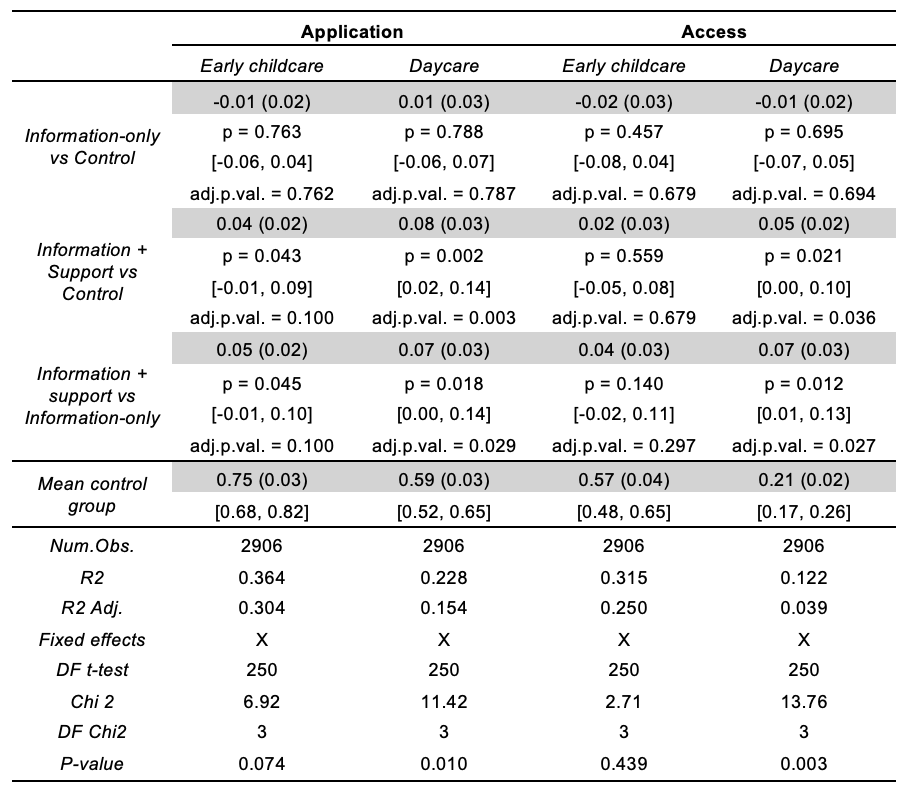New paper published in Nature Human Behavior
This paper, co-authored with Laudine Carbuccia, Coralie Chevallier, and Carlo Barone, uses a three-arm randomized controlled trial to test interventions aimed at increasing applications to formal childcare in France. We uncover the cognitive, procedural, and structural barriers that contribute to persistent inequalities in access.
We are thrilled to announce that our paper, Investigating how administrative burden and information costs affect social inequalities in early childcare access, has been published in Nature Human Behaviour
This research is part of Laudine Carbuccia’s PhD dissertation and she did an outstanding work building and managing the project from design, fund raising, hirings, data collection, programme implementation and analyses.
Background
While high-quality early childcare yields the greatest benefits for low-income and immigrant families, these groups remain systematically under-represented in formal childcare settings — even in France, where childcare is comparatively affordable and widely available. This gap persists despite strong parental intentions to use such services.
Our study investigates whether cognitive and behavioural barriers — rather than cost or availability — contribute to this “intention-to-application” gap.
Study Design
We conducted a randomized controlled trial (RCT) with 1,849 pregnant women in the Paris region. Participants were randomly assigned to one of three groups:
- Control group: Received unrelated information (e.g., maternal health).
- Information-only group: Received text messages with access to videos and reminders about early childcare options, costs, and how to apply.
- Information + support group: Received the same materials plus personalised phone-based assistance with the application process.
Our main outcomes were application and access to any formal early childcare, as well as to daycare centres specifically.
Key Findings
- Information alone did not increase application or access rates. We find no average or conditional effects of this treatment arm on any outcome.
- Offering personalised support increased the average application and access rates to daycare. However, it did not change the overall application and access rates for any formal childcare

Personalized support increased application rates, particularly among low-SES and immigrant households.
- Among compliers, the intervention nearly closed the application gap by SES and migration background.
Access rates, however, remained largely unchanged, except for a few subgroups (e.g., high-SES, dual-earner families).
Daycare-specific access increased for high-SES mothers only, suggesting persistent structural allocation biases.
We also found that the support intervention had larger effects among:
- Mothers with low prior knowledge of the childcare system,
- Families with no prior experience using early childcare,
- Mothers who were inactive in the labour market,
- And those with present-oriented preferences or low trust in the childcare system.
Policy Implications
Our findings point to a dual challenge:
- Cognitive and behavioural barriers, such as low procedural knowledge, choice overload, and psychological costs, can be addressed with scalable interventions.
- But structural barriers, such as opaque prioritization criteria, discretionary selection, and potential discrimination, persist even after application barriers are lowered.
For equitable access to early childcare, information and support are necessary—but not sufficient. Policy makers should complement behavioural tools with reforms to slot allocation rules, priority criteria transparency, and local supply equity. Without tackling both layers, inequalities in access will remain entrenched.
- 📄 DOI: https://doi.org/10.1038/s41562-025-02293-4
- 📄 Nature human behaviour: https://www.nature.com/articles/s41562-025-02293-4
- 📄 View-only published version: https://rdcu.be/eFAEA
- 📄 Preprint: osf.io/preprints/osf/w2ey7_v5